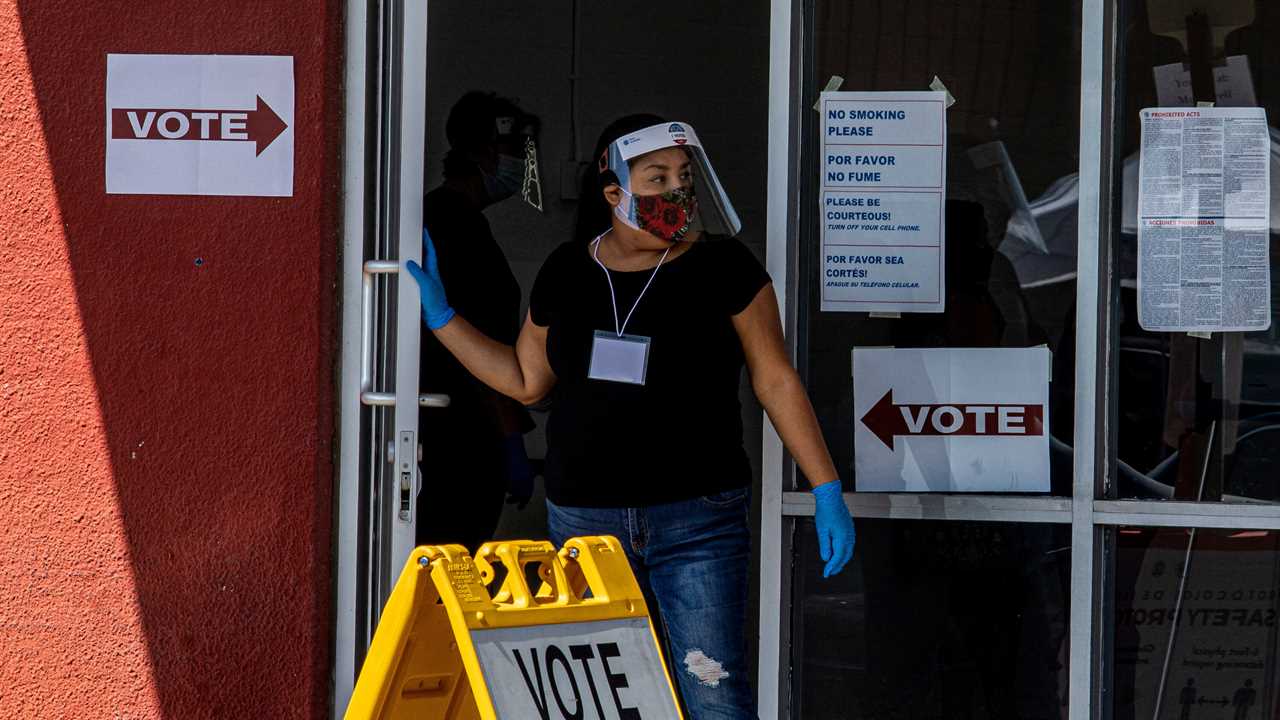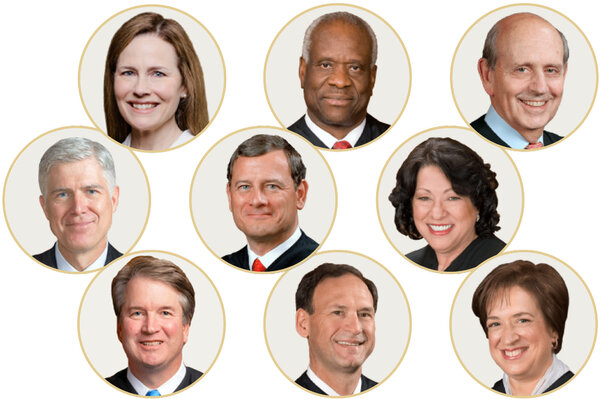
WASHINGTON — The Supreme Court on Thursday gave states new latitude to impose restrictions on voting, using a ruling in a case from Arizona to signal that challenges to laws being passed by Republican legislatures that make it harder for minority groups to vote would face a hostile reception from a majority of the justices.
The vote was 6 to 3, with the court’s three liberal members in dissent.
The decision was among the most consequential in decades on voting rights, and it was the first time the court had considered how a crucial part of the Voting Rights Act of 1965 applies to restrictions that have a particular impact on people of color.
The six conservative justices in the majority concluded that the relevant part of the act can be used to strike down voting restrictions only when they impose substantial and disproportionate burdens on minority voters, effectively blocking their ability to cast a ballot — a standard suggesting that the Supreme Court would not be inclined to overturn many of the measures Republicans have pursued or approved around the country.
“Where a state provides multiple ways to vote,” Justice Samuel A. Alito Jr. wrote for the majority, “any burden imposed on voters who choose one of the available options cannot be evaluated without also taking into account the other available means.”
In dissent, Justice Elena Kagan wrote that the majority had done violence to the Voting Rights Act, a civil rights landmark.
“Wherever it can, the majority gives a cramped reading to broad language,” she wrote. “And then it uses that reading to uphold two election laws from Arizona that discriminate against minority voters.”
Justice Kagan said the court’s action was a devastating blow to the nation’s ideals.
“What is tragic here,” she wrote, “is that the court has (yet again) rewritten — in order to weaken — a statute that stands as a monument to America’s greatness and protects against its basest impulses. What is tragic is that the court has damaged a statute designed to bring about ‘the end of discrimination in voting.’”
The ruling came at a time when disputes over voting have taken center stage in American politics, and it will draw new attention to congressional efforts to address new state voting restrictions.
An ambitious, sprawling bill being pushed by Democrats, called the For the People Act, is stalled in the evenly divided Senate. Unless moderate Democrats like Senator Joe Manchin III of West Virginia change their minds and agree to change Senate filibuster rules to allow legislation to pass with a simple majority rather than the 60 votes necessary for most bills, it has little chance of becoming law.
Some congressional Democrats hold out hope for narrower legislation, notably the John Lewis Voting Rights Advancement Act, which seeks to restore a key provision of the Voting Rights Act struck down by the Supreme Court eight years ago. Still, there is little sign of sufficient Republican support to get that measure through the Senate.
The court’s decision may also complicate the Justice Department’s suit against a new Georgia voting law.
“The court today also makes it harder to prove intentional racial discrimination in passing a voting rule, making it that much harder for D.O.J. to win in its suit against the new Georgia voting law,” Richard L. Hasen, a law professor at the University of California, Irvine, wrote in a blog post.
The larger message of the ruling was that the Voting Rights Act of 1965, hobbled after the Supreme Court in 2013 effectively struck down its central provision, retains only limited power to combat voting restrictions said to disproportionately affect minority voters’ access to the polls.
The 2013 decision, Shelby County v. Holder, concerned the law’s Section 5, which required prior federal approval of changes to voting procedures in parts of the country with a history of racial and other discrimination. But Chief Justice John G. Roberts Jr.’s majority opinion in that case said the law’s Section 2 would remain in place to protect voting rights by allowing litigation after the fact.
While Section 5 was available, Section 2 was used mostly in redistricting cases, where the question was whether voting maps had unlawfully diluted the voting power of minority groups. Its role in testing restrictions on the denial of the right to vote itself has been subject to much less attention.
President Biden said in a statement that “the court has now done severe damage” to those two important provisions of the Voting Rights Act.
“After all we have been through to deliver the promise of this nation to all Americans, we should be fully enforcing voting rights laws, not weakening them,” he said.
“While this broad assault against voting rights is sadly not unprecedented, it is taking on new forms,” Mr. Biden said. “It is no longer just about a fight over who gets to vote and making it easier for eligible voters to vote. It is about who gets to count the vote and whether your vote counts at all.”
In his majority opinion, Justice Alito wrote that states had a legitimate interest in rooting out fraud.
“Fraud can affect the outcome of a close election, and fraudulent votes dilute the right of citizens to cast ballots that carry appropriate weight,” he wrote. “Fraud can also undermine public confidence in the fairness of elections and the perceived legitimacy of the announced outcome.”
Justice Alito wrote that the court was not announcing an ironclad standard for lower courts to apply in cases challenging voting restrictions. “As this is our first foray into the area,” he wrote, “we think it sufficient for present purposes to identify certain guideposts that lead us to our decision in these cases.”
Justice Alito sketched out five guideposts.
First, he wrote, the burden imposed by the challenged restriction must be substantial. “Voting takes time and, for almost everyone, some travel, even if only to a nearby mailbox,” he wrote. “Mere inconvenience cannot be enough.”
Second, he wrote, courts should consider “the degree to which a challenged rule has a long pedigree or is in widespread use in the United States.”
Third, “the size of any disparities in a rule’s impact on members of different racial or ethnic groups is also an important factor,” Justice Alito wrote, adding that courts may discount disparities “to the extent that minority and nonminority groups differ with respect to employment, wealth and education.”
Fourth, courts must consider all of the ways voters can cast ballots.
Fifth, he wrote, courts should consider the state’s reason for the restriction. “One strong and entirely legitimate state interest,” he wrote, “is the prevention of fraud.”
Chief Justice Roberts and Justices Clarence Thomas, Neil M. Gorsuch, Brett M. Kavanaugh and Amy Coney Barrett joined the majority opinion.
Justice Kagan said the majority’s list of guideposts amounted to a recipe for voter suppression.
“The list — not a test, the majority hastens to assure us, with delusions of modesty — stacks the deck against minority citizens’ voting rights,” she wrote. “Never mind that Congress drafted a statute to protect those rights — to prohibit any number of schemes the majority’s non-test test makes it possible to save.”
Two restrictions were at issue in the case, Brnovich v. Democratic National Committee, No. 19-1257. One required election officials to discard ballots cast at the wrong precinct. The other made it a crime for campaign workers, community activists and most other people to collect ballots for delivery to polling places, a practice that critics call “ballot harvesting.” The law made exceptions for family members, caregivers and election officials.
Both restrictions were lawful under the court’s new guideposts, Justice Alito wrote.
The ban on out-of-precinct voting was justified, he wrote, because the burden of finding the correct polling place is minor; there are other ways to vote, including by mail; and the number of discarded ballots was small.
Justice Kagan saw things differently.
“Arizona is the national outlier in dealing with out-of-precinct votes, with the next-worst offender nowhere in sight,” she wrote. “In 2012, about 35,000 ballots across the country were thrown out because they were cast at the wrong precinct. Nearly one in three of those discarded votes — 10,979 — was cast in Arizona.”
“Elections are often fought and won at the margins — certainly in Arizona,” Justice Kagan wrote, noting that Mr. Biden defeated President Donald J. Trump by only 10,457 votes in Arizona last year.
Justice Alito also sustained the prohibitions on ballot collections under the new guideposts, saying that they imposed a minor burden, left open other ways of voting and were meant to combat fraud.
Justice Kagan responded that the measure disproportionately affected rural Native American communities that lacked ready access to mail service. Justices Stephen G. Breyer and Sonia Sotomayor joined Justice Kagan’s dissent.
The larger battle in the case was not whether the particular challenged restrictions should survive. The Biden administration, for instance, told the justices in an unusual letter that the Arizona measures did not violate Section 2. But the letter disavowed the Trump administration’s interpretation of Section 2, which would have limited its availability to test the lawfulness of all sorts of voting restrictions.
Justice Kagan wrote that the court’s decision might affect many new laws.

Tracking the Major Supreme Court Decisions This Term
Public opinion is closely divided on health care, voting, religion and gay rights cases.
“In recent months, state after state has taken up or enacted legislation erecting new barriers to voting,” she wrote. “Those laws shorten the time polls are open, both on Election Day and before. They impose new prerequisites to voting by mail and shorten the windows to apply for and return mail ballots. They make it harder to register to vote and easier to purge voters from the rolls. Two laws even ban handing out food or water to voters standing in line.”
“Some of those restrictions may be lawful under the Voting Rights Act,” she wrote. “But chances are that some have the kind of impact the act was designed to prevent — that they make the political process less open to minority voters than to others.”
Katie Benner contributed reporting.
Did you miss our previous article...
https://trendinginthenews.com/usa-politics/cheney-agrees-to-join-jan-6-inquiry-drawing-threats-of-gop-retribution






